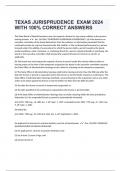Exam (elaborations)
TEXAS JURISPRUDENCE EXAM 2024 WITH 100% CORRECT ANSWERS
- Course
- Institution
The State Board of Dental Examiners may not suspend a license for any reason without a due process hearing.Answer - Sec. 263.004. TEMPORARY SUSPENSION IN EMERGENCY. (a) If the board or an executive committee of the board determines from the evidence or information presented that the continued prac...
[Show more]



